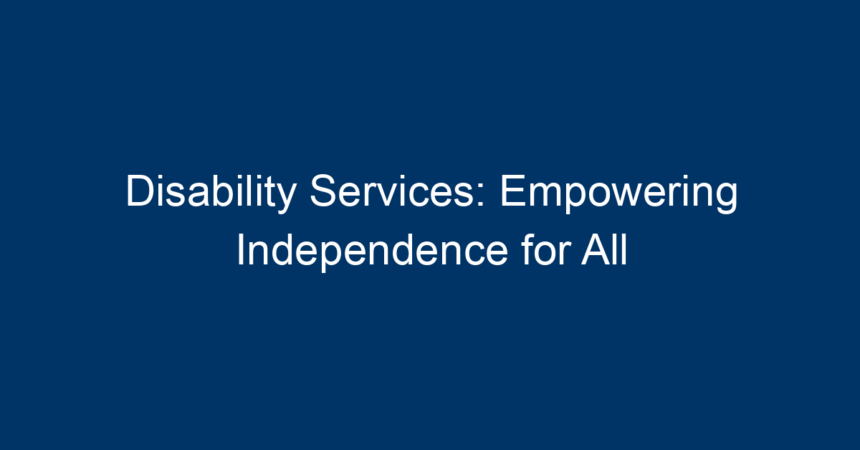In a world striving for equality and inclusivity, disability services play a crucial role in empowering individuals with disabilities to achieve independence and lead fulfilling lives. Whether it’s through personalized care, accessible transportation, or educational support, these services are designed to break down barriers and create opportunities. In this article, we will delve into the various facets of disability services and how they can transform lives.
Understanding Disability Services
Disability services encompass a wide range of support systems aimed at assisting individuals with physical, mental, or developmental challenges. These services can be provided by government organizations, non-profits, or private entities and cover several key areas:
- Residential Support
- Employment Services
- Healthcare Access
- Transportation
- Educational Support
Each of these areas is vital in ensuring that individuals with disabilities can participate fully in society.
Residential Support
Residential support is a cornerstone of disability services that focuses on providing individuals with a safe and supportive living environment. This can include group homes, assisted living facilities, or even in-home care services. The emphasis is on fostering independence while ensuring safety and accessibility.
Benefits of Residential Support
-
Safe Living Environment: Residential facilities are designed to be physically accessible, featuring ramps, wider doorways, and modified bathrooms.
-
Skill Development: Many residential programs include life skills training which enables individuals to learn essential tasks like cooking, budgeting, and self-care.
- Community Engagement: Living in group settings encourages social interaction and community building, reducing feelings of isolation.
Employment Services
Access to meaningful employment is essential for independence. Disability services in this area aim to help individuals find and maintain jobs that match their skills and interests.
Strategies for Employment Inclusion
-
Job Training Programs: Tailored training programs help individuals acquire the skills needed for various industries.
-
Workplace Accommodations: Many employers are willing to make reasonable adjustments to create inclusive work environments.
- Career Counseling: Guidance from professionals can empower individuals to navigate the job market effectively.
Healthcare Access
Healthcare is a critical aspect of disability services, encompassing both physical and mental health needs. Access to appropriate healthcare services can significantly enhance the quality of life for individuals with disabilities.
Importance of Healthcare Services
-
Preventive Care: Regular check-ups and screenings can detect health issues early, leading to better outcomes.
-
Mental Health Support: Many individuals with disabilities face mental health challenges. Access to counseling and therapeutic services can be transformative.
- Specialized Care: Individuals may require specific medical needs related to their disabilities, and healthcare providers must be equipped to meet those needs.
Transportation Solutions
Accessibility doesn’t stop at your home or workplace; it extends into the community. Accessible transportation services are vital for individuals with disabilities to engage meaningfully in society.
The Role of Transportation in Independence
-
Public Transit Accessibility: Many cities are improving public transportation systems by incorporating ramps, priority seating, and audio announcements.
-
Paratransit Services: Specialized transport services provide door-to-door support for those with mobility challenges.
- Ride-Sharing Solutions: Innovations in ride-sharing can offer flexible and affordable travel options for individuals with disabilities.
Educational Support
Education is a powerful tool for empowerment, and disability services in this sector aim to ensure that individuals with disabilities receive quality education tailored to their unique needs.
Enhancing Educational Accessibility
-
Individualized Education Plans (IEPs): These plans help tailor educational strategies to meet the specific learning needs of students with disabilities.
-
Assistive Technology: Tools like speech-to-text software and electronic reading devices can make learning more accessible.
- Inclusive Classrooms: Encouraging inclusive pedagogies ensures that all students feel valued and can thrive academically.
The Impact of Disability Services
The benefits of disability services extend beyond individual well-being; they also have a positive impact on communities and the economy.
Broader Benefits
-
Increased Workforce Participation: By offering appropriate support, more individuals with disabilities can enter the workforce, contributing to economic growth.
-
Social Inclusion: When individuals with disabilities are given opportunities to participate fully in society, it enhances community cohesion and understanding.
- Awareness and Advocacy: Disability services often engage in awareness campaigns that educate the public about disabilities, combating stigma and fostering a more inclusive society.
Challenges Faced by Disability Services
Despite the progress made in the field of disability services, challenges remain. Funding limitations, lack of awareness, and inadequate training for service providers can hinder the effectiveness of these programs.
Overcoming Barriers
-
Advocacy for Funding: Increased funding for disability services is essential for ensuring consistent and effective support.
-
Public Awareness Campaigns: Educating the public about disabilities can reduce stigma and promote inclusivity.
- Training Programs for Professionals: Ensuring that caregivers and service providers receive comprehensive training is crucial for offering high-quality support.
Taking Action: How You Can Contribute
Everyone has a role to play in empowering individuals with disabilities. Here are some actionable steps you can take:
-
Educate Yourself and Others: Understanding disability issues can foster a more inclusive perspective. Share your knowledge in your community.
-
Participate in Advocacy: Join organizations advocating for disability rights and support efforts to secure better funding and resources.
-
Volunteer or Donate: Many disability service organizations rely on volunteers and donations to remain operational. Consider contributing your time or resources.
-
Employ Inclusion Practices: If you’re an employer or an educator, implement practices that promote inclusion and accessibility in your workplace or institution.
- Support Local Initiatives: Engage with local programs that support individuals with disabilities, whether it’s through mentorship, employment, or recreational activities.
Conclusion
Disability services are vital in fostering independence and inclusivity for individuals with disabilities. By providing essential support in various aspects of life, these services help individuals overcome barriers and fully participate in society. It is our collective responsibility to advocate for, support, and engage with these services to create a more inclusive world. Together, we can empower independence for all.
Our society is richer when every individual has the opportunity to thrive. Let’s take these actionable insights and make a difference today!




